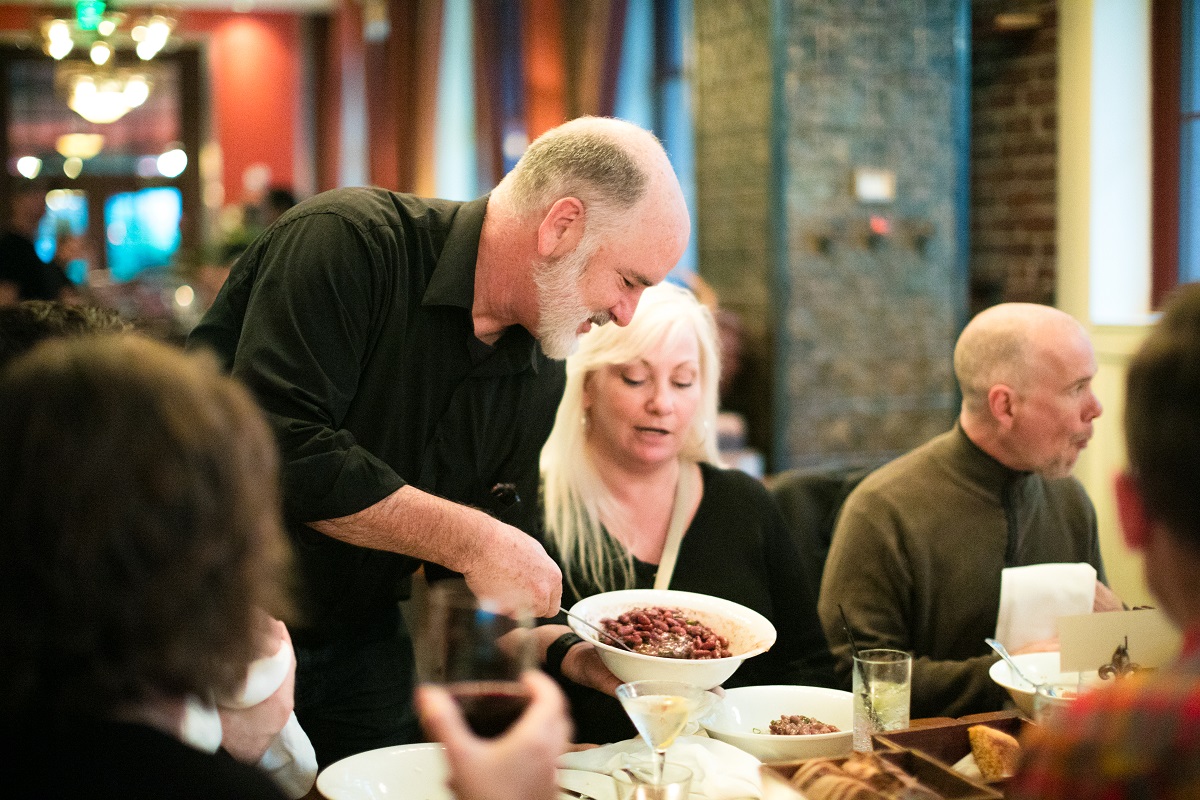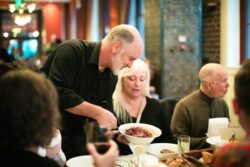Taking It on the Road
The Red Beans Road Show
Published: September 1, 2020
Last Updated: November 30, 2020

Photo by Molly de Coudreaux
Pableaux Johnson hosting a Red Beans Road Show event.
Red beans and rice is a simple dish, a stick–to–the–ribs country dish that has nourished generations in New Orleans and South Louisiana. It is so popular that Louis Armstrong signed his letters “red beans and ricely yours.” Local legend has it that the dish originated on Monday, which was traditionally laundry day. The person doing the washing could place a pot of beans on the back of the stove, along with the ham bone from the Sunday meal, knowing that when the washing was finished, a hearty, substantial dinner would be ready.
It’s a good story, but all too often, the race of the washerwoman was left out of the equation. Up until recently, in many families with any claim to gentility, the washerwoman was not the woman of the house, but an African American maid or housekeeper. A look in that direction opens up a larger, more international view of the story, which speaks to the dish’s connections with the Caribbean. Red beans are widely eaten in Jamaica and Haiti, where a cousin of the New Orleans dish is known as riz national (national rice). And while many think only of black beans in Cuba, those in the know understand that, in the island’s east, red beans are the preferred legume; they too have their version of red beans and rice.
Pableaux Johnson probably knew little of that as he was growing up in New Iberia, Louisiana, in the heart of a very, very close family ruled over by matriarch Elizabeth Lorelle Hebert, née Seal. His maternal grandmother lived in Baton Rouge, but kept her far–flung family close via telephone and, if they were in proximity, by feeding them at her twelve-foot table. When she died, he staked his claim to her table and, with it, ownership of her culinary legacy.
“This thing [the table] needs to be fed at least once a week. You have to gather people around it, so I decided to use red beans as an excuse to do that,” he explained. “Monday night is one of those dead spaces. So, I staked a claim to Monday nights and began to invite folks over to eat. Rather than trying to do a rotating menu, I decided I’m just going to do red beans and do it on the traditional night in New Orleans.”
Nineteen years later, the tradition still holds and the group keeps changing. “It’s never been the same group of people twice.” The rotating roster of guests is always an unusual Crescent City mix: New Orleans’s restaurant community rubs shoulders with university professors and visiting out–of–towners, as well as members of the city’s Social Aid and Pleasure groups and the Mardi Gras Indian tribes that Johnson has made the subject of his photographic work. Over the years, two rules evolved: No cell phones, and bring what you want to drink. Conversations range widely as old friends rediscover each other and new friends are made.
Following a suggestion from Ann Cashion, James Beard Award–winning chef and restaurateur in Washington, DC, he took the dinner on the road as the Red Beans Road Show. “At restaurants it is a partnership,” he explained. “We sell tickets ahead of time and hew as closely as we can to the spirit of my house.” People are seated randomly with strangers at tables of eight and advised to turn off their cell phones. Johnson begins the evening by explaining the concept, and then the host/partner chef does a starter and a dessert. Johnson is responsible for the main course (red beans in two versions: vegetarian and meat rich) and skillet cornbread. It’s all served family style. “When I’m doing one of these shows, I’m kind of like my grandmother. I look after their needs.” He circulates filling the cornbread baskets, moving from table to table, talking to people, encouraging them to mingle, and bringing a part of the culinary culture of South Louisiana to a new set of folks. What began as a dare in Washington, DC, has now taken Johnson and the Red Beans Road Show to audiences of appreciative eaters in sixty-three cities around the country.
Currently, the Road Show is off the road and the future of restaurant culture in the United States is difficult to forecast. One thing is certain. Pableaux Johnson will be on the road again as soon as he safely can, bringing the world red beans, skillet cornbread, and conviviality—in other words, a part of the culinary culture of South Louisiana that is as indomitable as its people.
Jessica B. Harris is the author, editor, or translator of eighteen books, including twelve cookbooks documenting the foodways of the African Diaspora. She has lectured widely and has written extensively for scholarly and popular publications. Dr. Harris is a member of the James Beard Who’s Who in Food and Beverage in America. In 2019, her books were inducted into their Cookbook Hall of Fame, and in March of 2020, she became a James Beard Lifetime Achievement awardee.
